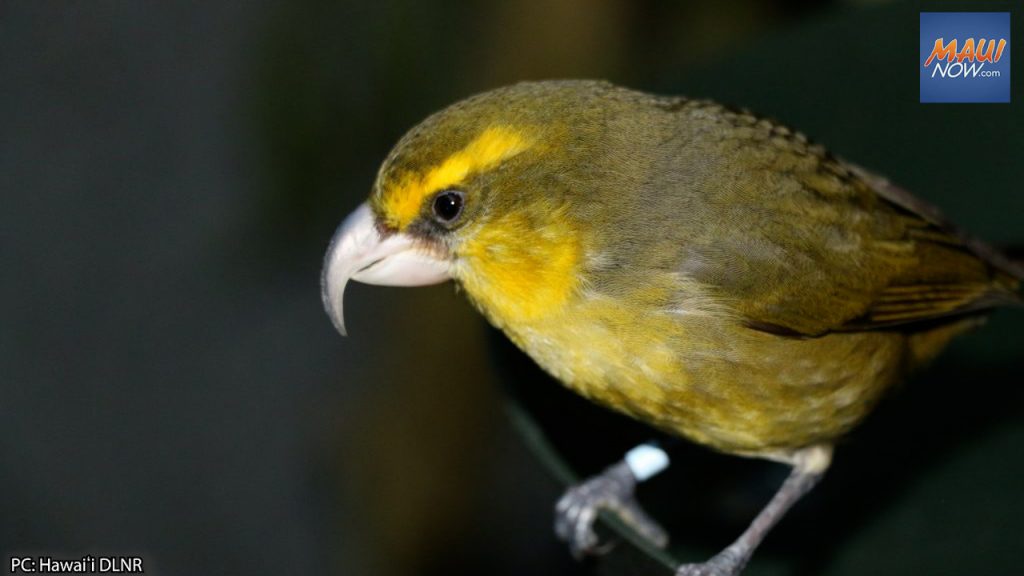Hawaiʻi delegation urges protection of critically endangered native forest birds

Today, the Hawaiʻi Congressional delegation—US Senators Mazie K. Hirono and Brian Schatz and Representatives Ed Case and Jill Tokuda—sent a letter to Charles “Chuck” Sams, Director of the National Park Service, urging the agency to prioritize its efforts to protect critically endangered Native Hawaiian forest birds.
In their letter, the lawmakers urge NPS to use funding from the Inflation Reduction Act (IRA) passed last year to continue efforts to protect native forest birds at Haleakalā National Park on Maui.
“As the National Park Service determines how to implement the Inflation Reduction Act, we urge you to continue prioritizing this urgent work as these culturally and ecologically significant birds face extinction,”wrote the lawmakers.
Native Hawaiian forest birds are imperiled by the spread of avian malaria, which is carried into their habitat and transmitted to the birds by invasive mosquitoes. Avian malaria caused waves of extinctions after it was introduced in the early 1900’s.
“Four Hawaiian honeycreepers are at risk of extinction within the next 10 years,” continued the lawmakers. “If we lose these special birds, we also lose the essential roles they perform within the native ecosystem and a piece of Hawaiian culture. Unless we take significant action now, they will be gone forever.”

Below is a full text of the letter:
ARTICLE CONTINUES BELOW ADDear Director Sams,
We write to you to express support for the Haleakalā National Park’s effort to implement landscape-level mosquito suppression to protect Hawaiʻi’s critically endangered native forest birds. As the National Park Service (NPS) determines how to implement the Inflation Reduction Act (IRA), we urge you to continue prioritizing this urgent work as these culturally and ecologically significant birds face extinction.
Native Hawaiian forest birds are imperiled by the spread of avian malaria, which is carried into their last remaining habitat and transmitted to the birds by invasive mosquitoes. Warming temperatures due to climate change have allowed mosquitoes to reach elevations that were previously refuge for the birds. Avian malaria caused waves of extinctions after it was introduced in the early 1900s and the continued impacts have been tracked for decades by researchers, land managers, and cultural practitioners alike.
ARTICLE CONTINUES BELOW ADAs pollinators and seed dispersal agents, Hawaiian honeycreepers fill an irreplaceable niche within Hawaiʻi’s native forests, which are the source of all our islands’ freshwater. Four Hawaiian honeycreepers are at risk of extinction within the next ten years: akikiki ~1 year; kiwikiu ~6 years; akekee ~8 years; and akohekohe ~10 years. If we lose these special birds, we also lose the essential roles they perform within the native ecosystem and a piece of Hawaiian culture. Unless we take significant action now, they will be gone forever.
NPS, in conjunction with other Department of the Interior (DOI) partners, has recognized the perilous situation. Last year, DOI released its “Strategy for Preventing the Extinction of Hawaiian Forest Birds”. Objective 1 of the strategy is to “develop and deploy Insect Incompatibility Technique (IIT) to reduce the mosquito vector of avian malaria by 2026.” The strategy also outlines cost estimates through Fiscal Year 2026, which shows that substantial investment will be needed for the foreseeable future. NPS invested $6 million of Infrastructure Investment and Jobs Act (IIJA) funding into Objective 1, and there has been more than $14 million of DOI-wide IIJA funding already allocated for saving the birds. Utilizing the available IRA funding to continue this work will ensure that that project and investments so far does not stall because there is no longer enough funding. With the urgent situation, we cannot afford to lose this time.
Thank you for NPS’s support for Hawaiʻi’s critically endangered native forest birds. We hope NPS will continue that support. Haleakalā National Park’s efforts so far have played a key role in making progress to give these irreplaceable birds a fighting chance, and we must not lose momentum.









